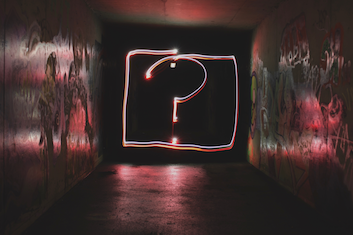It seems quite simple: we use a full stop to end a sentence and a question mark to end a question. But sometimes it can be a bit tricky working out whether we are dealing with a question or statement.
One category where writers often become confused is with indirect speech. If the sentence is structured in such a way that a thought or spoken question is presented as direct speech (with quotation marks), we use a question mark, and the question mark goes inside the quotation marks to indicate that the question is simply the group of words that form the speech or thought.
Susan wondered, ‘Did the participants find the course useful?’
If we structure the same idea as indirect speech, we use a full stop.
Susan wondered whether the participants had found the course useful.
If we use a question mark at the end of the second example, it changes the meaning of the sentence.
Susan wondered whether the participants had found the course useful?
The question is now whether or not Susan wondered a particular thought, not about whether or not the participants had found the course useful. The third example is a grammatically correct question – someone other than Susan conversing with a third person, for instance, might hypothetically ask such a question – but more often than not we will need the punctuation style of the second example. Questions like the third example occur only rarely, particularly in written English.


If you have found this post interesting, you can find a full index to my other posts on the index page. To be notified when I post a new topic, follow me on Facebook! If you have any particular questions you’d like me to answer in future posts, just send me a message. I’m always interested to learn what people think, and how you came across this site, so please post a comment.
If you think you would be interested in either my complete grammar course or an individual customised online course (particularly suited for people who don’t live in Melbourne), just click your preferred option.